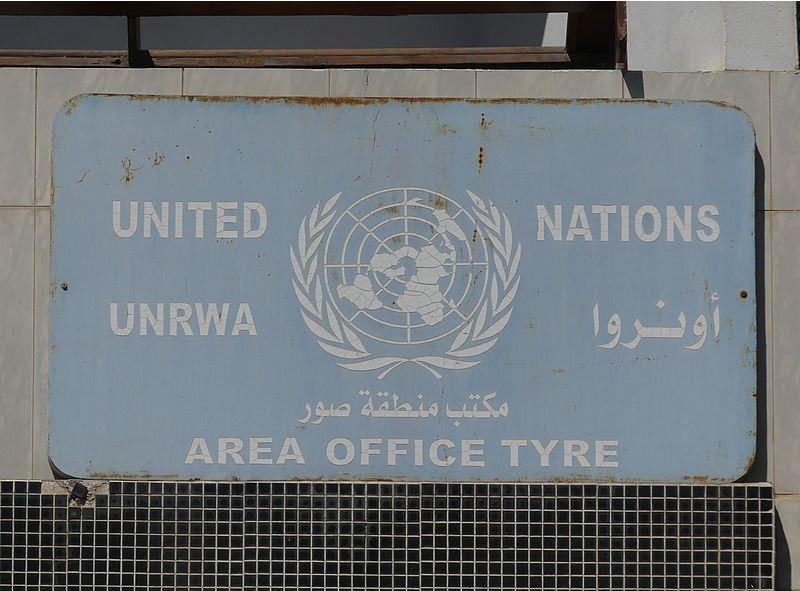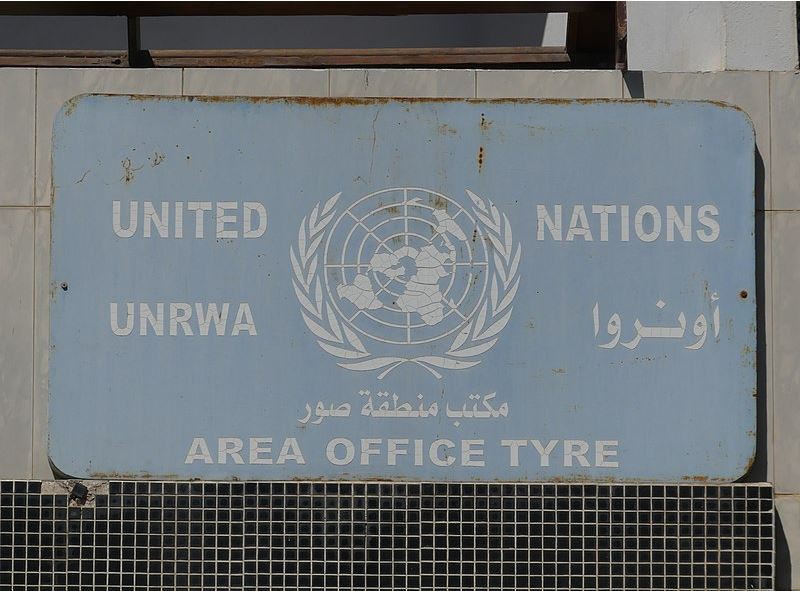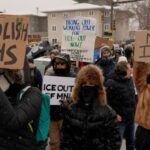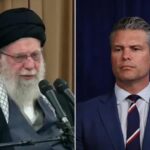

Photo Credit:UNRWA sign
Roman Deckert, via wikim cc4
Has UNRWA been deeply infiltrated by designated terrorist organizations?
Since Hamas’s savage attack against Israel on Oct. 7, 2023, the Israeli Defense Forces have been operating in Gaza to eliminate Hamas’s military and governance capabilities and to attempt to free the Israeli hostages.
During this operation, a wealth of new intelligence has been gathered on Hamas and Palestinian Islamic Jihad (PIJ) terror organizations.
Israeli forces have retrieved millions of documents of captured enemy material.
This new intelligence exposed two related issues:
First, the involvement of United Nations Relief and Works Agency (UNRWA) employees in the Oct. 7 massacre.
Second, the deep and systemic infiltration by terror organizations, particularly Hamas, into the ranks of UNRWA.
Overwhelming evidence show a significant number of UNRWA’s Gaza employees serve in the ranks of Hamas and other terror organizations, almost 500 of them in military positions. Others fill various paid roles in UNRWA, including senior positions. For example, at least eighteen school principals in Gaza are members of Hamas’s military wing.
More than thirty UNRWA facilities in Gaza have been found to contain terror infrastructures such as tunnel shafts, reflecting a systematic abuse of the status of these facilities for terror purposes.
In an official exposure by the Israeli Government, Hamas operated a high-end server farm directly under UNRWA’s Gaza headquarters, with communication and electricity cables connecting both compounds.
Israeli intelligence shows that Hamas considers UNRWA an essential asset both for maintaining its rule over Gaza and for exploiting its facilities to build terror infrastructure. As an official Israeli report put it, it is not a case of “a few rotten apples” as some, including the United Nations, have tried to portray it.
Multiple times in the past, Israel provided UNRWA with information on members of Hamas that were employed by the agency, yet no action was taken.
In January, as the full details were still being gathered, Israel discreetly shared initial details with UNRWA’s High Commissioner, Phillipe Lazzarini. This included the names of twelve UNRWA employees who had been identified at the time as having participated in the Oct. 7 massacre.
Subsequently, the U.N. Secretary General ordered an investigation by the U.N.’s Office of Internal Oversight Services (OIOS) but confined it only to the involvement of those twelve employees in the Oct. 7 massacre.
In addition, the Secretary General appointed an external Review Group to examine UNRWA’s neutrality mechanisms, chaired by former French Foreign Minister, Catherine Colona.
In early March, both bodies visited Israel where they received detailed briefings and information, including raw intelligence, exposing the full depth and breadth of the terror infiltration into UNRWA.
In parallel, the information was shared with Israel’s overseas intelligence partners and presented to relevant officials in UNRWA’s donor countries.
The oft-repeated UNRWA claim that Israel did not share information on the UNRWA-Hamas nexus is entirely false.
As new revelations on UNRWA were discovered, and following a thorough inter-agency assessment, Israel concluded that the terror infiltration into UNRWA’s Gaza operations posed a grave security risk and seriously jeopardized humanitarian efforts.
Furthermore, it was concluded that the problem cannot be fixed by reforms, or the introduction of new “neutrality mechanisms” in UNRWA, for two key reasons:
First, contrary to most of the donor governments, UNRWA – like the UN itself – does not regard Hamas as a terrorist organization.
As recently as February 2024, U.N. Under-Secretary-General for Humanitarian Affairs Martin Griffiths publicly stated that “Hamas is not a terrorist group for us, as you know, it is a political movement.”
Moreover, reforms will not change the basic fact that UNRWA in Gaza is the only U.N. entity in the world which runs a state-like enterprise employing 13,000 local staff members, managed by a small number of international staff, in an area controlled by a terrorist organization with a genocidal agenda (the Hamas Charter openly states that: “Israel will exist and will continue to exist until Islam will obliterate it, just as it obliterated others before it”).
UNRWA has yet to show any inclination to investigate the affiliation of over 2,000 of its staff in Hamas and other terrorist organizations, nor to dismiss them.
Equally troubling, UNRWA has not declared whether it considers employing Hamas militants as a breach of its neutrality.
Secondly, over the past decade UNRWA announced various reforms and new “mechanisms” ostensibly aimed at ensuring its neutrality to address public scandals and concerns by donors. However, an analysis of those measures shows that they were ineffectual and never fully implemented.T
This reflects either a lack of will or a lack of ability to apply steps which effectively prevent terror infiltration.
For example, UNRWA boasts it conducts quarterly “neutrality inspection” of its facilities, yet those checks are conducted by local staff (who may or may not be Hamas members), according to UNRWA’s own website, who are charged to look only for “political slogans in posters and graffiti,” not for any evidence of abuse by terrorist organizations:
A ’neutrality breach’ according to UNRWA’s definition is “taking sides in hostilities or engaging in controversies of a political, racial, religious, or ideological nature.”
Infiltration by a terror organization that then exploits UNRWA facilities to further their terror organization’s objectives goes far beyond a mere “neutrality breach.” It undermines all other humanitarian principles, including humanity, impartiality and independence.
UNRWA’s attempt to frame the issue as merely one concerning neutrality is misleading and points to ineffective solutions. Preventing terror infiltration of such massive proportion requires tools that UN agencies in the field do not have, starting with the ability to define local terrorist organizations as such, which the UN failed to do in the case of Hamas.
UNRWA must be, and can be, replaced in Gaza without hampering the humanitarian effort.
After the exposure of the extent of terrorist infiltration of UNRWA, Israel’s humanitarian policy has been to shift focus to working with responsible aid organizations that aren’t compromised by terrorist organizations. The priority has been to do so without hampering the goal of increasing and improving the humanitarian assistance provided to the civilian population in Gaza.
This policy was devised and approved after a thorough assessment of UNRWA’s role in the humanitarian effort and its functioning since October 7th. The assessment concluded as follows:
UNRWA has underperformed logistically on the ground since Oct. 7 including by failing to scale up its operations in a timely fashion while simultaneously trying to lead multiple operational areas in which it did not have deep expertise. UNRWA attempted to create a monopoly on the distribution of aid in Gaza at the expense of other humanitarian agencies. Instead of adopting a professional, solutions-oriented approach, UNRWA’s top leadership prioritized their political and media campaign against Israel which included countless baseless accusations and disinformation.
For a period of six weeks in February and March 2024 UNRWA didn’t make a single request to take aid to the north of Gaza where it was needed most. Instead, food relief was brought by other actors such as the private sector, other UN agencies and international NGOs.
Statistics show UNRWA’s shocking incompetence in a time of war. Since the start of the war, UNRWA was responsible for bringing in 15% of the aid, compared to 27% by the Egyptian Red Crescent and 20% by the World Food Program (WFP).
There are many other responsible humanitarian actors, including other UN organizations and over 43 NGOs currently operating in Gaza, who can take a larger role in aid distribution.
UNRWA’s functions in Gaza can be gradually transferred to more professional providers. UNRWA’s state-like function as a provider of basic services, such as education, health and garbage collection, could and should be transferred to local civilian authorities in post-Hamas Gaza.
Hamas, a designated terrorist organization, has repeatedly demonstrated that it prioritizes terror over the well-being of Gazan civilians. It exploits them as human shields and views a humanitarian crisis as an integral part of their war strategy. The effectiveness of the humanitarian efforts in Gaza, and the safety of the people involved in it, requires a complete delinking from Hamas, and from UNRWA.
It is known, at least to Israel, that the problem of the humanitarian aid project in Gaza is not in the delivery but in the distribution.
Despite months of damagingly false reporting, true statistics show that when UN World Food Program statistics are applied to Gaza, the amount of food that has poured into Gaza from Israel, according to COGAT, is at least three times the amount listed as the UN requirement, making famine impossible – unless the problem is in the distribution, not in the delivery. And this is where both Hamas and UNRWA collide when Hamas hijacks the food trucks, takes them to UN facilities, and distributes it through its own outlets and Hamas controlled markets. And UN facilities and workers were actively involved in this food scam.
Sadly, the U.N. and UNRWA’s leadership have chosen to downplay, even ignore, the severity of this scandal, leading to what might go down as one of the biggest whitewashes in the history of the United Nations.
Israel is now activating a graduated replacement of UNRWA in Gaza, without hampering the humanitarian effort.
The U.N. review processes of UNRWA have been a cover-up. This has been exposed by U.N. Watch, and now by the Israeli government. It must not lead to a resumption of funding to UNRWA neither in Gaza, nor in the area controlled by the Palestinian Authority.
The two U.N. reviews have very limited terms of reference mandated to investigate only the involvement of the initial twelve UNRWA employees whose names were provided in January.
The U.N. Review Group is not an independent review board. It is chaired by a biased Ms. Colona who was explicitly instructed by the terms of reference given to her by the biased U.N. Secretary-General not to investigate any allegations of breaches of neutrality by UNRWA “nor make any findings of fact in respect of them.”
Its mandate is limited to examining UNRWA’s internal mechanisms to preserve its neutrality. It does not even pretend to examine whether UNRWA’s reports, and public communications, abide by the principles of neutrality and impartiality.
The Israeli Government asks three pertinent questions.
Has UNRWA been deeply infiltrated by designated terrorist organizations?
Is UNRWA’s exposure to terror infiltration in Gaza beyond repair?
Can UNRWA be replaced in Gaza without hampering the humanitarian effort?
Israel’s assessment has resulted in affirmative answers to all three questions.
The UNRWA Review Group was explicitly instructed by the TOR given to it by the Secretary-General not to investigate any allegations of breaches of neutrality by UNRWA “nor make any findings of fact in respect of them.”
Ms. Colonna emphasized that point in her public statements both at the start of her position as the Review Group’s Chair, and after the release of the report.
Despite the narrow mandate of the Review Group, when it visited Israel, its members were presented with detailed information on Hamas’ infiltration of UNRWA, including a list of nearly 500 names and I.D.s of UNRWA employees who are also military operatives in Hamas or Palestinian Islamic Jihad.
It is now up to governments, parliaments and the public in donor countries, to make their own assessments and answer those questions before considering donating their taxpayers’ money to UNRWA, and through it to Hamas.
Israel provided UNRWA with a list of agency’s employees who were also Hamas members, yet no action was taken.
Letters from the years 2011 and 2012 were presented to the Review Group. In subsequent years, Israel continued to press this issue, demanding in particular the dismissal of Suheil al-Hindi, a leading Hamas member who served during those years as the head of UNRWA’s staff union. It was only in 2017, when Israel again raised the issue after it was reported that al-Hindi was elected as a member of Hamas’ Shura Council, that he finally quit his position in UNRWA.
This chain of events proves that UNRWA, as a matter of policy, repeatedly ignores concerns raised by Israel that it was employing Hamas members, long after 2011. In fact, at least two of the employees whose names were provided by Israel to UNRWA in 2011 are still employed by the agency today.
The UNRWA Review Group was presented with this information in its meetings in Israel yet chose not to mention it in its report.
The members of the Review Group were informed in their engagement with Israeli officials that over thirty UNRWA facilities in Gaza were found to contain terror infrastructure (e.g., tunnel shafts).
They were also alerted to the fact that UNRWA’s quarterly “neutrality inspections” of its facilities, according to its own website, only apply to the proper use of signage and absence of political posters or graffiti. However, abuse of the structure, its surroundings, and its resources (electricity, communication, water) by Hamas for terror or military purposes is not even on the checklist.
The UN Review Group’s report failed to specify what those inspections include, and only concluded that they “appear to be appropriate.” To her credit, the Chair recommended “widening the scope of installation visits to also include military misuse of UNRWA facilities.”
However, since those inspections are carried out by local UNRWA staff who may be involved with or intimidated by Hamas or other terrorist organizations, they will continue to be as unreliable as before.
Furthermore, the Chair did not recommend applying any sanction to managers of facilities where abuse was discovered. Nor did she specify what should be done with the tunnels or other terror infrastructure that was found in the U.N. facilities.
Underneath two of those schools, in 2017 and again in 2022, tunnels were exposed and reported by Israel. Yet, despite warning the U.N. of their presence, they were found to be operational when the IDF arrived and dismantled them during the current war in 2024.
The longest chapter in the report (14 pages) is dedicated to the “grave violations of neutrality” in UNRWA’s education system. It appears that Ms. Colonna takes this matter seriously, which is a welcome approach. However, it is also clear that UNRWA’s dependence on host governments (in this case the Palestinian Authority and Hamas) for the curriculum taught in its schools inevitably contradicts the principles of neutrality, impartiality and independence. All the proposed procedures for reviewing textbooks and banning non-UN-compliant content have failed time and again.
The simple truth is that a U.N. agency is not supposed to run an education system, especially not in a highly politicized conflict environment, and not one that promotes an everlasting refugee status that does not apply to any other refugee grouping anywhere in the world.
On the FAQ page in its website, UNRWA says it is “a strong advocate for the protection and promotion of the rights of Palestine refugees,” yet what these rights entail is itself at the very heart of political controversy. It cannot present itself as an ‘advocate’ of these rights without displaying bias and embroiling itself in political and ideological controversy.
UNRWA is the only U.N. agency that explicitly states that it advocates for the rights only of one party to a conflict, while claiming to remain a neutral humanitarian actor.
It is regrettable, and significant, that the UNRWA Review Group chose to ignore such a constant breach of neutrality.
Elsewhere in the world, education is considered as a public service which should be provided by local authorities, not as humanitarian assistance for the U.N. to provide.
UNRWA will never be neutral as long as this built-in bias remains in place, and nowhere is this more significant than in the indoctrination and training of Palestinian children and teenagers in UNRWA schools and summer camps, that teach of a world without Israel and a violent hatred of Jews.
UNRWA does not even consider itself obliged to be neutral and impartial in its public communications. The issue is particularly vexing given that UNRWA affirms advocacy as part of its duties, yet blatantly expresses bias in its advocacy.
UNRWA finances, accommodates, and stages, political vitriol against Israel in its schools and summer camps.
Israel has produced irrefutable evidence that UNRWA facilities house command and logistics centers for the Palestinian Hamas terror organization in Gaza.
The result of U.N. and UNRWA handiwork in the Palestinian cause has been an unrelenting campaign of condemnation and death, and a refusal to accept Israel as an integral nation in the Middle East.
UNRWA has been an obstacle to peace in the Middle East for decades and must be disbanded.
Barry Shaw is an International Public Diplomacy Associate at the Israel Institute for Strategic Studies.




